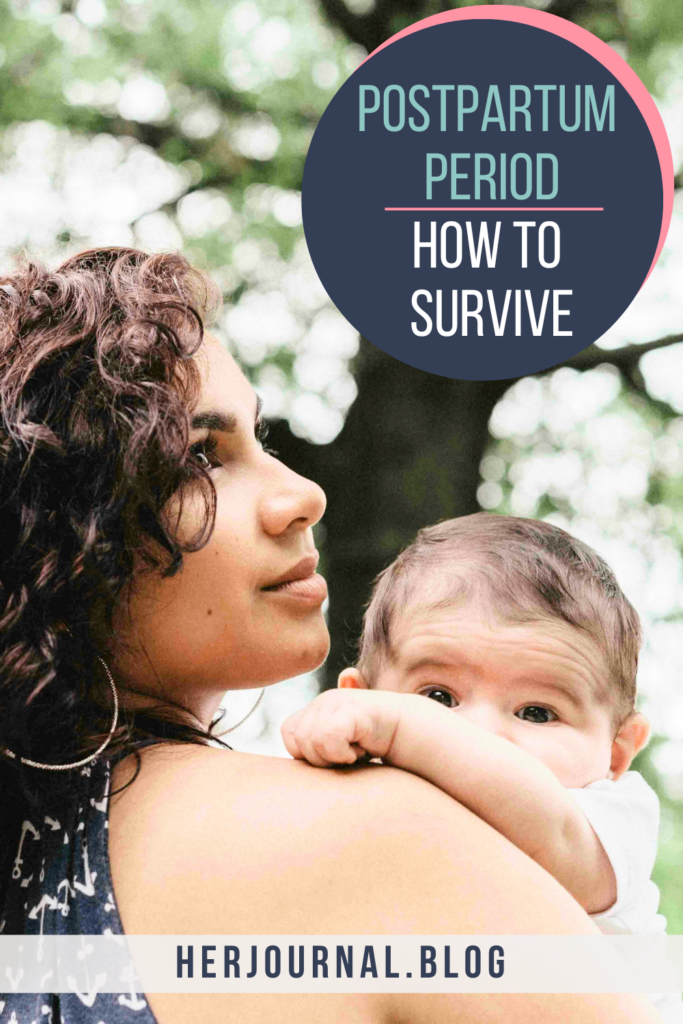We may earn money or products from the companies mentioned in this post.
Last Updated on September 10, 2024 by Samantha Flores
Preparing the hospital bag and making a birth plan is only part of what needs to be done when you are getting ready to welcome a baby. What many moms don’t realize is that they also need to prepare for the postpartum period.
Think of it like a vacation: there is packing (step one) and then going on the actual vacation (step two). What you forget to plan for is the exhaustion you will feel afterward when you think you need a vacation from your vacation (step three).
Pregnancy and birth are only steps one and two of welcoming a new baby into your life. Don’t forget about step three: the postpartum period. The more you can plan ahead now, the better it will be for you and your family once your sweet baby makes his or her arrival.
Related: 3 Common Myths About Life After Pregnancy

What is the Postpartum Period?
The postpartum period is known as the time immediately following birth up to six weeks postpartum. In my opinion, the postpartum period doesn’t end that soon: it takes a full year to adjust to a new life. Just because you might be cleared for exercise and sex at six weeks doesn’t mean you are mentally prepared to get back in the groove of life again.
According to the National Institutes of Health, the postpartum period for a woman and her newborn is a critical time for both long-term and short-term health and well-being. Therefore, it’s important to plan ahead and prepare for your postpartum period. Yours and your baby’s health and well-being depend on it.
How to Survive the Postpartum Period
Use the following six tips on how to survive the postpartum period. As a mom of three, I have put together some tips that I have learned during all three of my postpartum experiences.
Ask for help
The number one thing you can do to survive the postpartum period is to ask for help. It is simply too much to try to do everything on your own, especially when you are still healing. Ask your partner or spouse for help, family members, friends, and other people in your community who can help.
Asking for help doesn’t make you any less of a mom or a person. Everyone needs help at some point in their lives. Postpartum is one of the most vulnerable times in a woman’s life. This is the perfect time to allow yourself to heal and bond with your baby while allowing others to help you. Remember, other people want to help you!
Related: Postpartum Hair Loss: What to Expect and How to Help

Follow the 5-5-5 postpartum rule
If you haven’t heard of the 5-5-5 postpartum rule, here is it:
- Five days in bed: Immediately following birth, you need to give yourself time to rest and recover. This is a critical time in your healing process and it is also important for the bonding experience with your baby.
- Five days on the bed: You are still healing and focusing on rest, but you can sit up more often. This is a time when you can do things like read a book or watch some TV.
- Five days around the bed: Now, you can stand up and move around the bed more often. However, you still want to limit standing to no more than 30 minutes for now.
You may start to feel a little stir-crazy following this rule, but it is very important to follow. The last thing you want to do is overexert yourself and have to start your healing process over again. Postpartum bleeding can last for up to six weeks after birth. Therefore, the amount of time you spend now resting and healing will help your bleeding and potentially prevent any postpartum hemorrhaging.
Allow yourself to rest
I get it; I’m a mom of three. The idea of resting is almost laughable because I have kids to tend to. It is even more difficult to let myself rest when there is mom guilt that sneaks up. However, I am no good to anyone if I don’t allow myself to rest.
Following the birth of my third baby, I really gave myself permission to rest during the postpartum period. Yes, I had two older kiddos that I wanted to care for as well. But, I also had a husband and family to help care for them while me and Baby rested.
If you don’t give yourself time to rest now, this can greatly impact the bonding you have with your baby and your healing. Your body needs rest! It has just grown and birthed an entire human. You’ve done enough, trust me. Let go of the guilt and remember that this is only a season.
Use a journal
Using a journal in the postpartum period can be extremely beneficial for your postpartum mental health. While you are focused on healing and bonding, it can be easy for your mind to play tricks on you. Keep your thoughts written down so that they don’t weigh you down.
In addition, you can refer back to your journal and remember those sweet early weeks with your baby. Place your journal on a table or nightstand next to your bed to remind you to write in it. You can also use an app on your phone to keep a digital log of your thoughts.
Remove expectations
You can’t predict how quickly you will heal or how your body will recover after birth. Therefore, it’s best to remove any expectations you have set for yourself. Don’t give yourself deadlines because you could push yourself too hard or become upset if you don’t meet them.
When you remove expectations, you give yourself permission to rest and to just be present. Stay off of social media if you feel yourself experiencing FOMO (fear of missing out). Also, it’s best not to compare yourself to others because your experience and your body are different from someone else.
Contact a postpartum therapist or coach
Prenatal therapy has become more available in recent years. Take advantage of it by partnering with a postpartum therapist to help you with your mental health. Some therapists are covered by insurance and may be offered virtually for your convenience. Keep in mind that each therapist has a specialty. Look for a therapist who has experience and education with postpartum mental health.
In addition, you can look for a postpartum coach. This is someone who isn’t a therapist, but a specialist or advocate for postpartum mental health. There are many postpartum coaches available, like me! Let’s work together to help you feel confident as a mom and lift the fog of the postpartum period. Send me an email to inquire: samantha@herjournal.blog
Related: Losing Yourself in Motherhood? 3 Tips to Get Back on Track

How to Prepare for the Postpartum Period
If you are pregnant, it is best to prepare for the postpartum period ahead of time instead of trying to figure things out on the fly. Use the following tips to give yourself a better chance at a positive postpartum experience.
Prepare frozen meals
There is an abundance of postpartum frozen meal ideas on Pinterest. You can choose to prepare just dinners, or you can also prepare frozen breakfasts. This is especially helpful if you have older children who depend on you for food. The last thing you want to do after birth is cook.
Frozen meals are easy to pop into the oven and let cook while you continue to rest. If preparing these meals is too cumbersome for you, you can always opt for frozen meals from your grocery store. There are frozen lasagnas, pizzas, and other pasta dishes to help get you through.
Set up a meal train
In addition to having frozen meals prepped, consider setting up a meal train for your postpartum period. Having home-cooked meals is good for the heart and for your healing. Ask friends, family, co-workers, and even your neighbors to join.
You can also someone else to set up the meal train on your behalf if you don’t want to be the organizer for it. Each person who wants to help simply chooses a date on the calendar to bring over a meal. They can drop it off on your porch at a specific time that is best for you.
If some people aren’t able to bring you a meal, there are also options to donate to your meal train so that you can use the funds to order yourself some food. Look into meal train websites to help you choose the right one.
Make a plan for kids and/or animals
If you have older kids and/or animals, it’s best to set up a plan of care for them ahead of time. Think about school drop-offs and pick-ups, if applicable. If your other children aren’t in school, sometimes having a friend or family member care for them for a couple days could be best for you to thoroughly rest.
Animals require attention as well, especially cats and dogs. Ask for help with your pets if anyone can come over to care for them for you or take them to their home for a few days to help you recover. Having this planned ahead of time will save you a lot of time and stress.
Related: Preventing Postpartum PTSD: A Comprehensive Guide
Create your village
You’ve heard it before, but I’ll say it anyway: “It takes a village to raise a child, but it also takes a village to raise a mother.” Mothers aren’t meant to do motherhood alone. Create your village ahead of your baby’s arrival.
Give each member of your village a task they can help with when you have the baby. Ideas for tasks for your village include:
- Taking care of older kids and/or animals
- Preparing the meal train
- Picking up groceries for you
- Sending you weekly check-in text messages
- Cleaning your home while you rest
- Folding laundry once per week
These are just some ideas to consider. Whatever tasks would help you rest, ask your village to do it for you instead.
Talk to your partner or spouse
Your spouse or partner is the first person in your village. They will be going through this experience with you. Therefore, it’s important to have those hard conversations beforehand so that you each know the expectations going into postpartum.
Some conversation ideas to have with your spouse or partner include:
- Who will get up with the baby at night?
- How long will you wait until you have visitors over?
- Who will change diapers?
- How will you each get a break?
- Who will be in charge of ensuring bills are getting paid on time?
There are many conversations to have before your baby joins you Earth side. Start with these ideas and see where the conversations lead you. Write down your answers and hang them on your fridge to remind each other of the expectations during the postpartum period.

The Postpartum Period Doesn’t Last Forever
Although the postpartum period is intense, remember it doesn’t last forever. This is a season of life that should be handled with care. Make the best of this time because it can be challenging.
The best advice I can give is to just take it one day at a time. This is a time for survival. Do what you have to do in order to survive the sleep deprivation and the change to your lifestyle. As much as you want to “get back to normal,” it’s best to focus on what you can control each day instead.
The postpartum period is a beautiful time; a baby is born and so is a mother! It’s a transition unlike any other. You can do this! Use the tips in this guide to help you survive. You will be thriving in no time at all.
Related: How New Moms Can Manage Stress And Anxiety At Home
Pin It!




